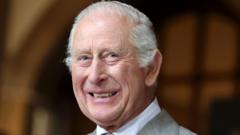King Charles III is making headlines as he embarks on a momentous visit to Canada, a trip marked by political tension following President Donald Trump’s reckless suggestion that Canada should be part of the United States. Former Canadian high commissioner to the UK Jeremy Kinsman notes, "This is a big deal for the King to do this," reinforcing the King's role as a symbol of support for Canada amidst rising U.S. influence. The King will become the first monarch in nearly 70 years to officially open Parliament in Canada, with his speech set to convey a strong stance on Canadian sovereignty.
Kinsman anticipates a clear message in the King’s address, asserting Canada's independence and rejecting any notion of it becoming the "51st state." Prime Minister Mark Carney's recent electoral victory, rooted in anti-Trump sentiment, will likely further shape the content of the King's speech, which will be delivered in both French and English. It is expected to feature personal remarks from King Charles, as he integrates his own sentiments into a carefully crafted government-approved text.
The state occasion differs significantly from the grand Westminster ceremonies; the King will appear in a suit rather than traditional adornments, focusing on policy issues affecting the Canadian populace. Speculation surrounds potential references to First Nations communities, enhancing the King's message of inclusion during his first visit to Canada since taking the throne.
Kinsman emphasizes, "The King has long experience and great skill in walking that diplomatic tightrope," highlighting the importance of maintaining good relations with the U.S. while reaffirming Canada’s autonomy. Despite Trump’s controversial stance, the monarchy holds significance, and former Canadian minister Mel Cappe suggests that the King might include his own thoughts to express solidarity without directly confronting Trump.
The King’s diplomatic skills are further underscored by the delicate balance he must maintain between the UK's relationship with the U.S. and Canada's aspirations for independence. Critics like Peter Donolo from the Canadian International Council argue that the monarchy’s role in this instance is inconsistent and irrelevant to Canada’s situation. Meanwhile, political scientists like Elizabeth McCallion express that many Canadians are watching closely for the King's stance, hoping for an affirmation of national identity following Trump's distressing comments.
Ultimately, as King Charles III prepares to navigate these turbulent waters, his visit is not just ceremonial; it serves as an opportunity to reaffirm Canadian sovereignty and unity amidst external pressures. The symbolic weight of the King's address may resonate deeply within the broader context of U.S.-Canada relations, leaving many to ponder the future of these longstanding ties.




















